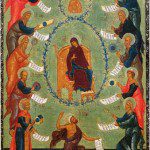![By en:Michael BurghersAlekjds at en.wikipedia [Public domain or Public domain], from Wikimedia Commons](https://wp-media.patheos.com/blogs/sites/637/2016/09/Burghers_michael_saintpolycarp-227x300.jpg)
Now, as Polycarp was entering into the stadium, there came to him a voice from heaven, saying, “Be strong, and show yourself a man, O Polycarp!” No one saw who it was that spoke to him; but those of our brethren who were present heard the voice. And as he was brought forward, the tumult became great when they heard that Polycarp was taken. And when he came near, the proconsul asked him whether he was Polycarp. On his confessing that he was, [the proconsul] sought to persuade him to deny [Christ], saying, “Have respect to your old age,” and other similar things, according to their custom, [such as], “Swear by the fortune of Cæsar; repent, and say, Away with the Atheists.” But Polycarp, gazing with a stern countenance on all the multitude of the wicked heathen then in the stadium, and waving his hand towards them, while with groans he looked up to heaven, said, “Away with the Atheists.”[1]
The early Christian apologists had to find a way to deny the charge of atheism while showing why they disagreed with Roman piety. They had to find a way to show they had something in common, a belief in God in common, with their polytheistic critics while not being polytheists themselves. How was this possible? How can they at once say that they were in agreement with the pagans on God and so worship God in common with them, thereby showing how Christianity was not atheism, while denying the legends and rites of the traditional cults? Was it even possible to say Christians believe in the same God with the Romans when they clearly did not follow the teachings of Christ? And yet, this is what the apologists had to do, time and time again, before exposing what they thought were the errors of polytheism. They had to make the distinction between the ultimate object of reverence and the way that object was understood (or misunderstood), so as to show that there was a common unity with the pagans by having a faith in one supreme Creator-God even as they had to show they did not have the same knowledge or understanding about that God. The two have to be held together because if they were not, then even Christians will end up not worshiping the same God with each other because each person would have a different understanding of God based upon their own unique experiences and intellectual capabilities.
This was not an easy task, and to be sure, much of what the apologists wrote were discussions of various pagan myths and legends, and the errors being spread by those who held on to them in the most literal fashion. But, even then, the apologists did point out how the myth-making poets could be shown to be talking about the one true God.













